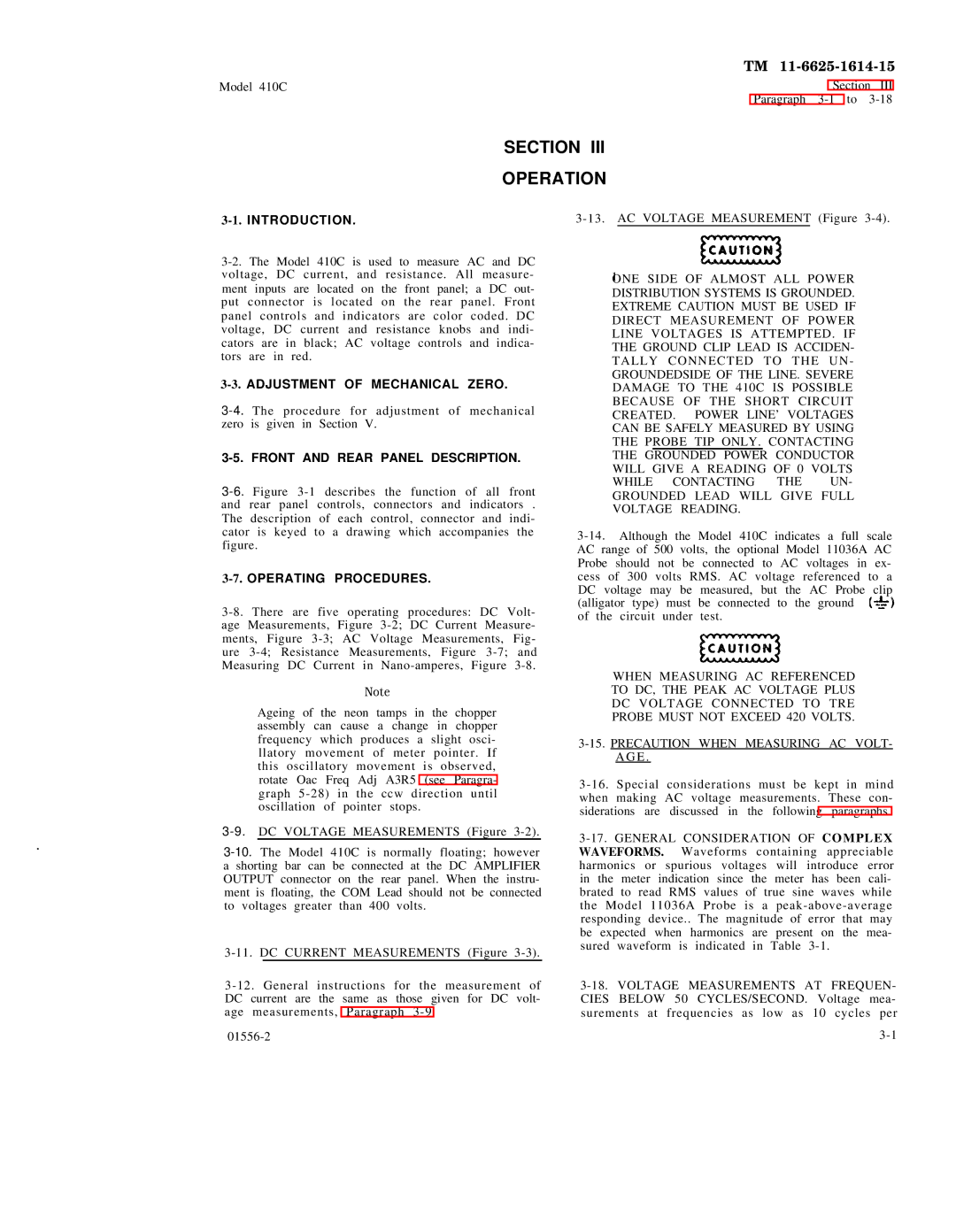3-1.INTRODUCTION.
3-2. The Model 410C is used to measure AC and DC voltage, DC current, and resistance. All measure- ment inputs are located on the front panel; a DC out- put connector is located on the rear panel. Front panel controls and indicators are color coded. DC voltage, DC current and resistance knobs and indi- cators are in black; AC voltage controls and indica- tors are in red.
3-3.ADJUSTMENT OF MECHANICAL ZERO.
3-4.The procedure for adjustment of mechanical zero is given in Section V.
3-5. FRONT AND REAR PANEL DESCRIPTION.
3-6.Figure 3-1describes the function of all front and rear panel controls, connectors and indicators . The description of each control, connector and indi- cator is keyed to a drawing which accompanies the figure.
3-7.OPERATING PROCEDURES.
3-8. There are five operating procedures: DC Volt- age Measurements, Figure 3-2; DC Current Measure- ments, Figure 3-3;AC Voltage Measurements, Fig- ure 3-4;Resistance Measurements, Figure 3-7;and Measuring DC Current in Nano-amperes, Figure 3-8.
Note
Ageing of the neon tamps in the chopper assembly can cause a change in chopper frequency which produces a slight osci- llatory movement of meter pointer. If this oscillatory movement is observed, rotate Oac Freq Adj A3R5 (see Paragra- graph 5-28) in the ccw direction until oscillation of pointer stops.
3-9.DC VOLTAGE MEASUREMENTS (Figure 3-2).
.
3-10.The Model 410C is normally floating; however a shorting bar can be connected at the DC AMPLIFIER OUTPUT connector on the rear panel. When the instru- ment is floating, the COM Lead should not be connected to voltages greater than 400 volts.
3-11. DC CURRENT MEASUREMENTS (Figure 3-3).
3-12. General instructions for the measurement of DC current are the same as those given for DC volt- age measurements, Paragraph 3-9.
3-13. AC VOLTAGE MEASUREMENT (Figure 3-4).
1ONE SIDE OF ALMOST ALL POWER DISTRIBUTION SYSTEMS IS GROUNDED. EXTREME CAUTION MUST BE USED IF DIRECT MEASUREMENT OF POWER LINE VOLTAGES IS ATTEMPTED. IF THE GROUND CLIP LEAD IS ACCIDEN- TALLY CONNECTED TO THE UN - GROUNDEDSIDE OF THE LINE. SEVERE DAMAGE TO THE 410C IS POSSIBLE BECAUSE OF THE SHORT CIRCUIT CREATED. POWER LINE’ VOLTAGES CAN BE SAFELY MEASURED BY USING THE PROBE TIP ONLY. CONTACTING THE GROUNDED POWER CONDUCTOR WILL GIVE A READING OF 0 VOLTS
WHILE CONTACTING THE UN- GROUNDED LEAD WILL GIVE FULL VOLTAGE READING.
3-14. Although the Model 410C indicates a full scale AC range of 500 volts, the optional Model 11036A AC Probe should not be connected to AC voltages in ex- cess of 300 volts RMS. AC voltage referenced to a DC voltage may be measured, but the AC Probe clip (alligator type) must be connected to the ground  of the circuit under test.
of the circuit under test.
WHEN MEASURING AC REFERENCED TO DC, THE PEAK AC VOLTAGE PLUS DC VOLTAGE CONNECTED TO TRE PROBE MUST NOT EXCEED 420 VOLTS.
3-15. PRECAUTION WHEN MEASURING AC VOLT- A G E .
3-16. Special considerations must be kept in mind when making AC voltage measurements. These con- siderations are discussed in the following paragraphs.
3-17. GENERAL CONSIDERATION OF COMPLEX WAVEFORMS. Waveforms containing appreciable harmonics or spurious voltages will introduce error in the meter indication since the meter has been cali- brated to read RMS values of true sine waves while the Model 11036A Probe is a peak-above-average responding device.. The magnitude of error that may be expected when harmonics are present on the mea- sured waveform is indicated in Table 3-1.
3-18. VOLTAGE MEASUREMENTS AT FREQUEN- CIES BELOW 50 CYCLES/SECOND. Voltage mea- surements at frequencies as low as 10 cycles per

![]() of the circuit under test.
of the circuit under test.